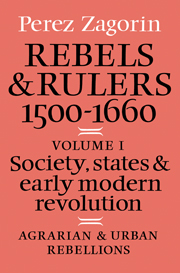5 - Economy, conjunctural factors, the crisis of the seventeenth century
Published online by Cambridge University Press: 12 January 2010
Summary
In the two preceding chapters, we have been examining the context of our early modern revolutions primarily from the standpoint of structures – both structures of society and structures of government and politics. In the first, we have considered the form of society in which these revolutions occurred, certain of the larger collectivities of which it consisted as a society of orders, and their pertinent characteristics and interrelations. In the second, we have looked at the monarchical state of the period, its political system and governmental features, and the weaknesses to which it was prone. We are justified in describing these as structures because we are dealing in both cases with durable configurations persisting through time in a dynamic interplay of institutions and conditions, which create at once the arena and limits of possible action by revolutionary actors. There will be a specific determinate relation between every revolutionary event and these structures that enclose them and with whose general characteristics they are in some particular way coordinated.
In the present chapter we have in view a different kind of context, consisting not of structures but of events, contingencies, and trends belonging broadly to the economic domain. These do, of course, interact with structures and may help to modify them in the long run, but they are nevertheless distinct from them. The matters that fall under this head have sometimes been referred to by French scholars as conjoncture. They include prices, taxes, rents, subsistence crises, trade cycles, contractions and expansions – in short, singular occurrences and short- and long-term movements and convergences chiefly of an economic character.
- Type
- Chapter
- Information
- Rebels and Rulers, 1500–1600Society, States, and Early Modern Revolution, pp. 122 - 139Publisher: Cambridge University PressPrint publication year: 1982
- 1
- Cited by



